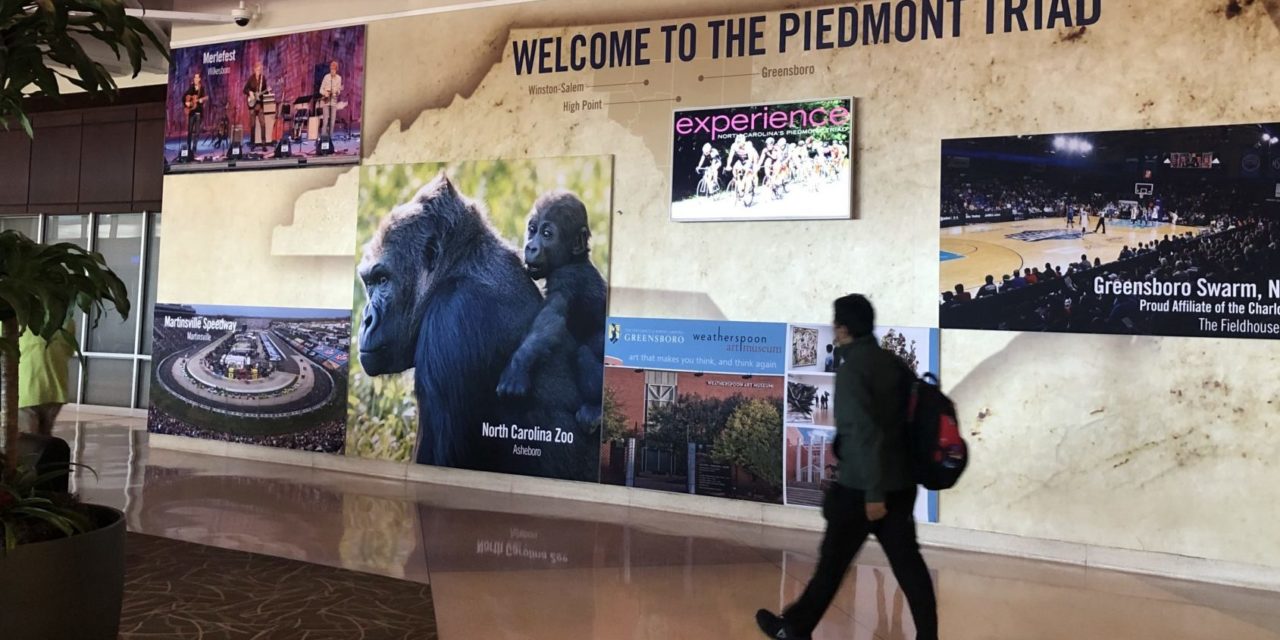The COVID-19 pandemic seems to be calming down and now many people who could use the virus as an excuse not to visit family members during the holidays will have to start traveling to see them again this holiday season.
Also, those who truly enjoy visiting family members will be flying more as well. Given the coming expected upsurge in passenger traffic over the next two months, Piedmont Triad International Airport (PTIA) officials have put out their list of rules, guidelines and suggestions to make your plane trip better and safer.
The release starts off on a positive note with a statement by PTIA Executive Director Kevin Baker.
“PTI staff and our many partners are prepared to offer a safe, secure, and efficient customer experience during the holiday travel period,” Baker stated.
Then the press release gets down to business and tells people what to do while flying.
The first rule should come as no surprise to anyone: “Bring and wear a mask.”
Other guidelines acknowledge the uncertainty of flight schedules in this day and age. For instance, even if you have a boarding pass, it says, you should “reconfirm airline flight status” since schedules may change due to weather or other factors.
Also, before leaving home, check in online in advance and download your boarding pass to your phone. Security officers and the airlines accept mobile boarding passes.
PTIA officials also advise that you allow plenty of time to arrive, park and make it through the security screening and check-in process.
Passengers should also be aware of security checkpoint requirements. They are to remove “all personal electronics larger than a cell phone” from their carry-on bags and put them in bins “with nothing above or below them so that TSA officers can get a clear X-ray image of these items” that include laptops, tablets, e-readers, cameras, etc. For more information on this point, visit www.tsa.gov.”
Also: “Be patient if delays occur. Aviation professionals around the globe are working together to get travelers to their destinations safely and on time.”
Though airport officials didn’t phrase it this way, that’s a nice way of reminding everyone that lately people have gone nuts on planes after long delays or requests to wear a mask – and they don’t want to see that type of thing on flights departing and flying into PTIA.
The press release advises: “Prepare for security screening delays during the holidays. There are more travelers who are not as familiar with the rules and procedures for air travel and security. TSA screening procedures allow passengers 12 and under and 75 and older to leave their shoes on, and the adult group to leave on light jackets. TSA Pre-Check is offered at PTI.”
Here are some other things to consider this year:
“• Limit your stress by limiting your carry-on baggage. Airlines are enforcing tighter restrictions on the amount/size of baggage you may carry onto planes. Bring only one bag that will fit under the seat or in the overhead bin and one personal item, such as a purse or briefcase.
“• Place medicine, jewelry, cameras and other valuable items in your carry-on baggage.
“• Handle prohibited items properly. Remember that firearms, ammunition and knives are prohibited at the TSA checkpoint. For a complete list of permitted and prohibited items, visit www.tsa.gov.
“• Food items such as pies and cakes are permitted through security checkpoints, but may require further inspection. If travelers are not sure if a food item is considered a liquid or gel it is best to pack the item in checked baggage or ship it to a destination in advance.
“• Remember 3-1-1 for liquids: Liquids, gels, aerosols, creams and pastes must be 3.4 ounces or less and all bottles must fit in one quart-size plastic bag and placed in a bin for screening. This includes sun block and tanning sprays. One quart-size bag is permitted per person.”
The “TSA Cares” program may help some this season. Travelers or families of passengers with disabilities and medical conditions can call the TSA Cares helpline (1-855-787-2227) or visit https://www.tsa.gov/contact-center/form/cares with any questions about screening policies, procedures or about what to expect at the security checkpoint. Injured service members and veterans – including those associated with a wounded warrior program – can contact TSA Cares for help as well.
(Photo courtesy of Sharon Dente.)


They just make this stuff up to satisfy their phoney-baloney jobs. 3.4oz of liquids? Was that number drawn in a lottery?
All these rules are easy for me. I ain’t subjecting myself to harassment by know-it-all cattle-prodders telling me not to clear my nose while in the screener, or not to fart near a TSA worker. Rampant cancellations; stuffed in 22″ seats next to who-knows-what. I would compare it to watching an NFL game interrupting a torrent of wokie commercials.
Who needs it?
3.4 oz is 100 ml, the amount of liquid explosives al Qaeda tried to use to take down transatlantic jets about 10 years ago. Collective punishment at its finest.
I learned something today. Would not 90ml do the job, or 110ml? Both or neither?
It’s all for show anyway. You pass the TSA checkpoint, buy a bottle of liquid near the gates and do whatever evil you meant to in the first place.